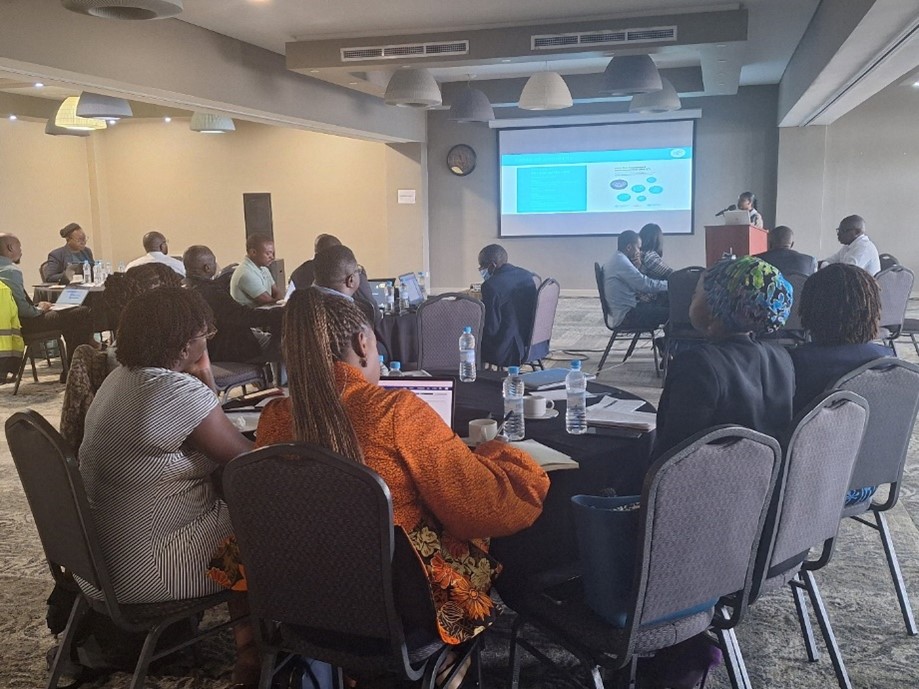
Following the identification of ten priority zoonotic diseases in Zambia in July 2023, a second Joint Risk Assessment (JRA) workshop was held in November 2024. The focus of the workshop was three of the priority zoonoses in Zambia; African Trypanosomiasis, Plague, and Cysticercosis. This built on progress made at the first JRA for anthrax, rabies and avian influenza in December 2023.
Using Joint Risk Assessments to inform risk management of zoonotic diseases
Zambia’s Joint External Evaluation (JEE) identified its capacity to assess potential threats as an area for strengthening. Subsequently, one of the objectives in the Zambian National One Health Strategic Plan is to conduct risk assessments and in July 2023, Zambia identified and prioritised ten zoonotic diseases of concern. These include: African Trypanosomiasis, Anthrax, Enteric Diseases (Salmonellosis), Viral Haemorrhagic Fevers (Ebola), Rabies, Plague, Influenza like Illnesses (Zoonotic Avian Influenza), Zoonotic Tuberculosis (ZTB), Cysticercosis and Brucellosis. Following this prioritisation, the first JRA was completed in December 2023 for three of these zoonoses - anthrax, rabies and avian influenza. The JRA provides decision makers with scientifically sound advice that can be used to inform risk management and communication policies for effective response to a zoonotic disease threat.
Assessing the threats of African Trypanosomiasis, Plague, and Cysticercosis
The second JRA workshop held in November 2024 risk assessed a further three of the prioritised zoonoses; African Trypanosomiasis, Plague, and Cysticercosis. The Zambia National Public Health Institute (ZNPHI) organised the workshop with support from partner organisations, including UKHSA IHR-SP who provided technical expertise and facilitated the workshop, and the Food and Agriculture Organization (FAO).
It brought together around 30 professionals from 11 key government sectors, institutions and other agencies that provide support for various aspects of human, animal, and environmental health. When these sectors collaborate to contribute data, knowledge, and expertise, the amount and quality of information available to estimate risks and therefore the validity of the risk assessment increases significantly.

Prof Roma Chilengi, the Director General of ZNPHI, opened the workshop and gave the keynote address and official opening remarks. He emphasised the importance of these risk assessments to the preparedness of the country and described the One Health approach as a “call to action…in addressing health challenges at the human-animal-environmental interface”. He thanked UKHSA and FAO for facilitating the workshop and encouraged the participants from all the sectors to fully engage and collaborate with the JRA. Lukeki Kaindama, IHR-SP’s One Health Technical Lead spoke on behalf of UKHSA Dr Niwael Mtui Malamsha on behalf of the FAO.
On the first day of the JRA workshop Dr Raymond Hamoonga (ZNPHI) gave an overview of zoonotic diseases in Zambia with a focus on the burden and impact of African Trypanosomiasis, Plague, and Cysticercosis.
This was followed by a familiarisation to the JRA concept, JRA modules and process by Lukeki (UKHSA) and Kayula Mwila (FAO). The JRA Operational Tool used in this workshop is a systematic process of risk assessment which is used to assess the likelihood of introduction, possible outbreak and impact of zoonotic infectious diseases at the human-animal-environment interface.
Using Zambia's multi-sectoral expert consensus to inform future outbreak response
The participants were split into three mixed sector groups to work on the three different diseases. Over the next two days the groups worked on their diseases following the steps of the JRA process and updating each other on progress through plenary presentation and discussion sessions to reach a consensus.
The workshop culminated in three reports being produced that covered the recommendations made by the multi-sectoral group of experts for each of the three prioritised zoonoses. The recommendations will be incorporated into existing and future outbreak response plans in Zambia and will ultimately contribute to strengthened capacity to detect and respond to these health threats, improving health security.
A further JRA workshop is being planned for 2025 to complete the remaining four prioritised zoonoses. IHR-SP will continue to support and provide technical expertise through ZNPHI.